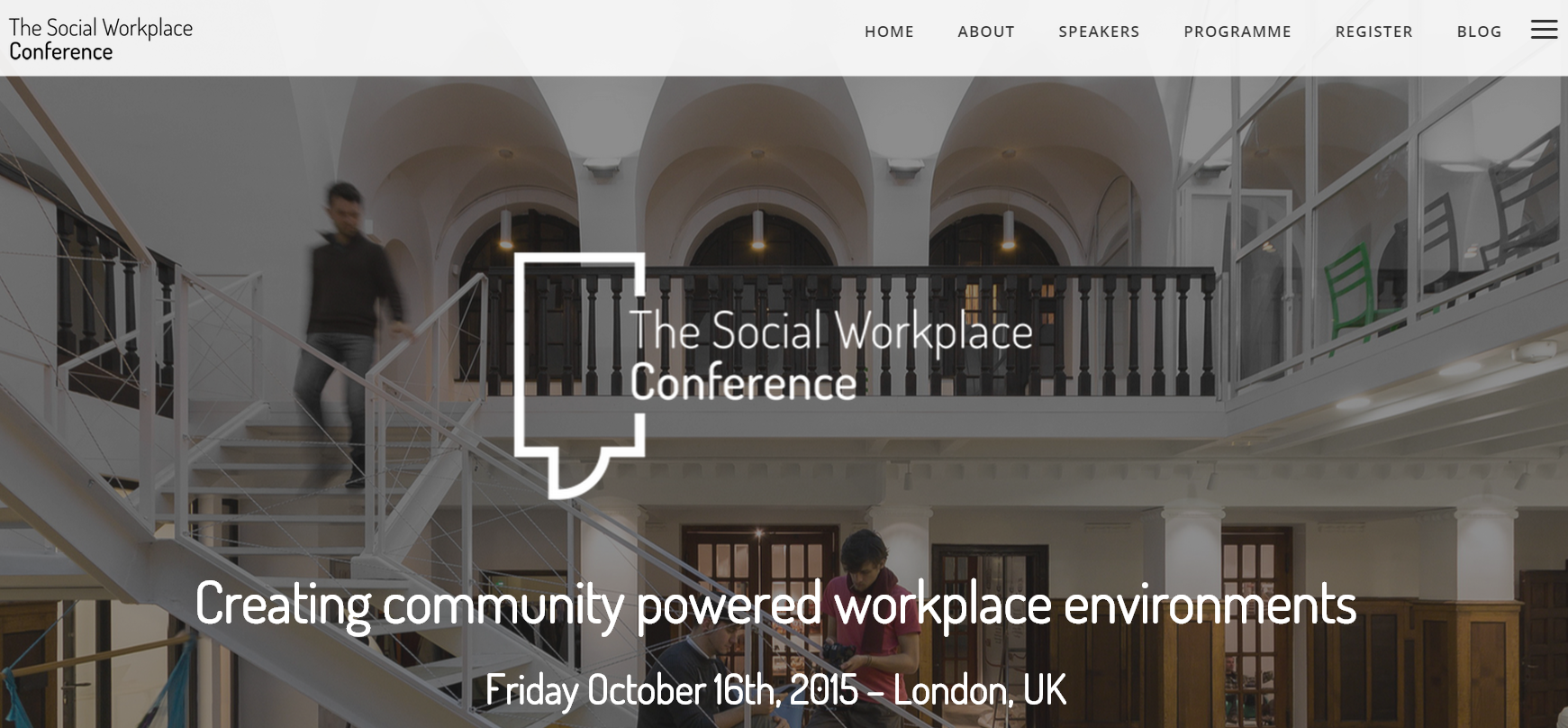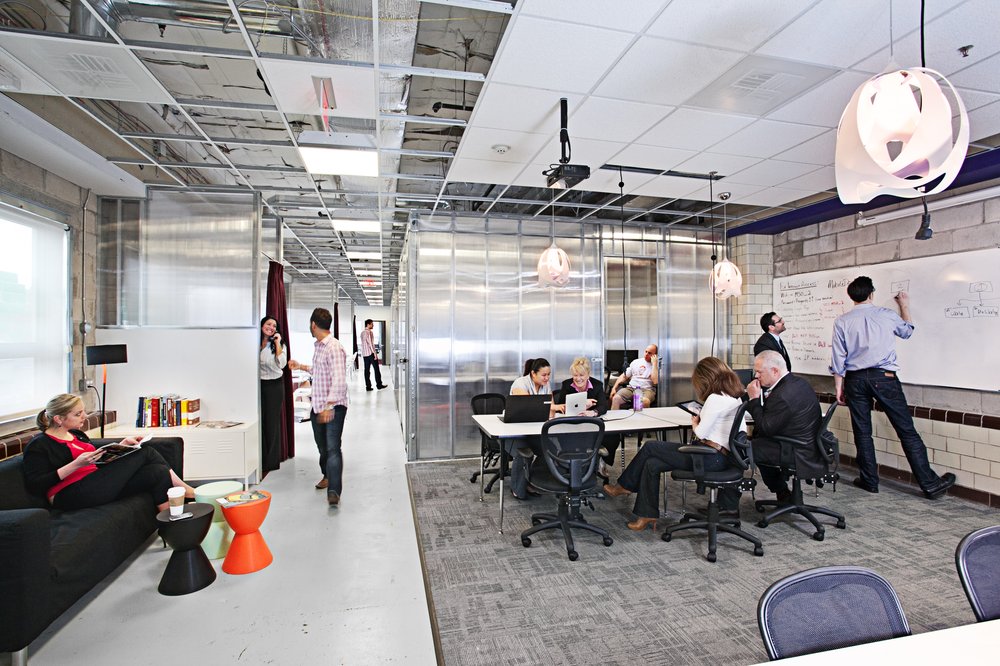Can companies implement the coworking model?
In recent years, the coworking movement has broadened; there are more and more spaces, which reach an increasingly wider community and have attracted investments of around $1bn in the last year. This has undoubtedly helped the concept be progressively more "in trend" and the number of medium-sized and large companies interested in the ins and outs of the model is on the rise. As a result, there are also more events and training programmes aimed at promoting collaboration in professional working environments. Since 2011, Unwired has hosted the Worktech conference on the future of work, spaces, technology and innovation. The event has been held in cities all over the world and the next one will take place in Singapore in September. London is also going to be host to the first edition of “The Social Workplace Conference” organised by Global Enterprise, the consulting firm behind Coworking Europe.

Photo source: The Social Workplace Conference website
How can medium-sized and large companies benefit from the virtues of coworking? Can the coworking model be extrapolated to these organisations? Let's look at two situations or models:
1.- Companies that use spaces' infrastructure
The number of companies that allow their employees to work remotely or teams that are spread across the world is on the increase. Buffer is a great example of one of these teams, with 31 people in 22 different countries at present. Joel Gascoigne (CEO) explains the advantages and disadvantages of working with this company model. The norm is that these teams turn to coworking spaces for a base outside of their homes. There are several advantages for this type of model:
- Productivity: Although we shouldn't generalise, we are faced with so many distractions when we work from home. A coworking space offers a professional environment.
- Reduced costs: Companies can reduce their investment in offices by combining working remotely with using work spaces as and when they're needed.
- Interaction: Coworking spaces are diverse and open. The collisions that occur are positive for a project's development.
- Flexibility: Sometimes companies may be put off by their remote team sharing a space due to privacy and confidentiality issues. However, more and more spaces are offering private offices. Spaces like Indiegrove, Mission50 and The Working Capitol all combine private offices for teams and other more flexible models.

- Horizontality: A coworking space mainly hosts independent professionals or small companies. This means that there are no hierarchical relationships, which can exist in some large companies, like Facebook or Twitter.
- Bootstrapping: Many coworking spaces get their own community involved in the space's design and construction (ideas, assembly, etc.). This really helps develop a sense of belonging and identity.
- Diversity: While the main motto in large companies is unambiguous and corresponds to the organisation's macro-vision, we can find several projects, interests and various "mottos" in a coworking space.
Related stories
Onboarding With Nexudus: Laying the Foundation for Thriving Spaces
Discover how Nexudus' expert onboarding team can offer you a seamless implementation experience tailored to your coworking and workspace needs. Get started now!
The importance of analytics for coworking and flexible workspaces
Discover how the right analytics and reporting tools can offer a competitive advantage to coworking flexible workspace operators who want to improve the member experience, become financially sustainable, and grow.
Personal & Professional Growth in Coworking
How can companies demonstrate to employees that today's workspace offers more than just a desk and chair? And how can the modern workspace better align itself with its employees' personal and professional growth?
CRM de la Crème: a recipe to better serve your customers
In our recent blog, we unravel the key CRM components for efficient workspace management. Dive into how Nexudus harnesses these CRM features to streamline workspace operations and elevate the customer experience.
The Challenges of Working from a Coworking Space in 2023
We always talk about how wonderful flexible coworking spaces are on so many levels. However, today, I'll be concentrating on addressing some of the most common concerns that individuals face when deciding whether to work in a flexible workspace or send their team to one!
Flexible Workspaces Management: Simplifying Corporate Success
Working from home is indeed not a new concept, at all! AT&T started to eliminate unused offices in 1991. Three years later, as part of an experiment to explore the extent to which a large organisation could revolutionise the workplace by bringing work to the employees, it had 32,000 employees working from home.
10 Tips For Getting the Most Out Of Nexudus
Whether you're a Nexudus newbie and are looking for some ways to get started or you’ve been using Nexudus for a while and want to unlock its full potential - you’ve come to the right blog post.
Future-Proofing Your Coworking Space: Adapting to 2023 Trends - Part 2
Discover the Interconnected Challenges in the Coworking Industry: Real Estate Prices, Inflation, Staffing, and Community Building. Your key insights for achieving success in 2023!
Future-Proofing Your Coworking Space: Adapting to 2023 Trends - Part 1
Discover the Key Challenges and Strategies for Success in the Coworking Industry from the Insights from the 2023 Coworking Trend survey.
State of Remote Work 2021: What does it mean for coworking and flex workspaces?
Owl Labs recently published their 2021 State of Remote Work Report. In this article, we take a look at some of the key findings and consider what they mean for coworking and flexible workspaces.

